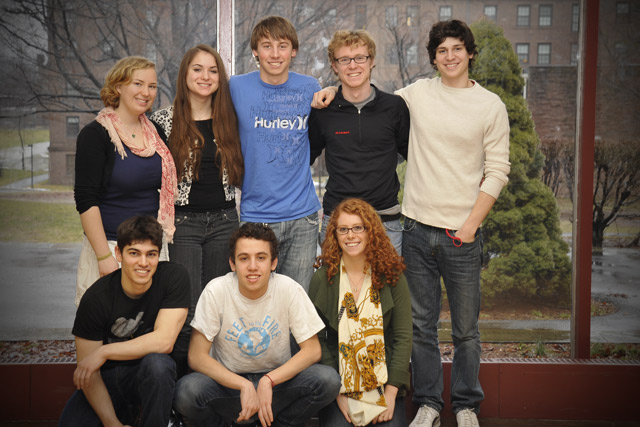8 Students Assist Haitian Children during Spring Break

Eight Wesleyan students will assist victims of the January 2010 Haiti earthquake by offering hands-on community-based disaster relief during their spring break.
Between March 7-19, Elijah Meadow, Haley Baron ’12, John Snyder ’12, Ali Patrick ’13, Barbaralynn Moseman ’13, Michael Steves ’13, Stefan Skripak ’13 and Jacob Eichengreen ’13 will be setting up camps for children and planting community food gardens in Port-Au-Prince.
They will be assisting the Ananda Marga Universal Relief Team-Haiti (AMURT). AMURT volunteers assist local residents, allowing them to grow and help their own communities. To date, the non-profit organization has distributed emergency food rations, tarps, tents and other supplies to more than 15,000 Haitian residents. They’ve also built 10 healing and education centers, which will benefit more than 5,000 children.
In preparation for the trip, the students are learning how to speak Haitian Creole with Haitian native Holly Nicolas, Wesleyan Station department assistant. They’ve also consulted with Barbara Dedman, director of nursing, and Robin Zup, medical billing specialist, in Wesleyan’s Health Services Department, where they received the necessary vaccinations.
Each student is paying for the trip out-of-pocket, which tallies in at $1,300. This includes airfare, vaccinations, meals, water, security and transportation. They’ve borrowed tents and sleeping bags from Wesleyan’s Outdoors Club, and are actively soliciting donations for medical supplies and craft projects for the Haitian children.
Eichengreen, who is leaning towards a degree from the College of Social Studies, has done service work in his hometown of Colorado Springs, Colo., but never something on the same scale as volunteering with disaster victims.
“I breathe the same air as people in Tibet. I drink the same water as people in Somalia. I purchase goods made by people across the globe,” he says. “What happens to them also happens to me. Even in a place as remote and isolated from the international mainstream as Haiti, I feel obligated to go help because the people there are not all that different from the people I know at home.”
Baron, who is double-majoring in sociology and Spanish, has interned at the Coalition on Homelessness in San Francisco, Calif., supporting illegal immigrant families who needed clothing and jobs. She also taught an impoverished town in Ecuador about efficient trash and health practices.
Baron has a long-time interest in developing countries and the concept of a post-conflict society, specifically domestic issues of homelessness, poverty and East African politics.
“As I continue to learn about both of these topics, I realize that both are on different levels, one systematic, but more individual and the other societal are both situations in which people are post-conflict,” she says. “This is where I connect Haiti. I feel that the enthusiasm and dedication the eight of us wield can really create positive change in Haiti, something that is greatly needed. I just want to be able to make some type of change, even if that is making one child’s day better.”
Joe Bruno, vice president for Academic Affairs and provost, says service to the community has been a Wesleyan core value since the earliest days of the university’s existence. This commitment is continually reaffirmed by the efforts of colleagues in the Center for Community Partnerships and by the volunteer work done by Wesleyan students, faculty and staff in Middletown and elsewhere.
“The extraordinary efforts of these eight students involved in service to Haiti and the Haitian people is surely another excellent example,” Bruno says. “We can all be proud of their commitment and dedication to this important cause, and we should look forward to learning of their experiences when they return.”
While in Haiti, the students will video and photograph their daily activities, and ask the Haitian children to take pictures with disposable cameras. Eichengreen says he’ll use the media to encourage other students to volunteer.
“I’m sure the experience will be rewarding, but as for right now, it’s pretty nerve-wracking,” Eichengreen says. “Just when you think you’ve remembered everything and have it all taken care of, you remember that you have a five-page paper due tomorrow and three tests this week.”

